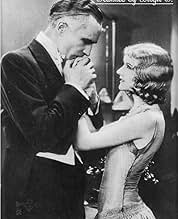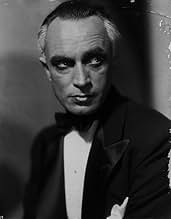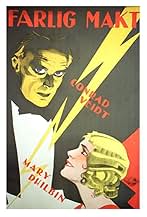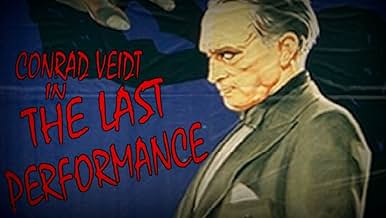Füge eine Handlung in deiner Sprache hinzuA middle-aged magician is in love with his beautiful young assistant, who is in love with his young protege', who turns out to be a bum and a thief.A middle-aged magician is in love with his beautiful young assistant, who is in love with his young protege', who turns out to be a bum and a thief.A middle-aged magician is in love with his beautiful young assistant, who is in love with his young protege', who turns out to be a bum and a thief.
Fred MacKaye
- Mark Royce
- (as Fred Mac Kaye)
Gusztáv Pártos
- Theatre Manager
- (as Gustav Paros)
Walter Brennan
- Clown
- (Nicht genannt)
Rosita Delmar
- Undetermined Secondary Role
- (Nicht genannt)
Greta Granstedt
- Sister Act
- (Nicht genannt)
Julia Griffith
- Sword Trick Spectator
- (Nicht genannt)
Ruth Jennings
- Sister Act
- (Nicht genannt)
Bela Lugosi
- Erik's Screen Voice in Hungarian Version
- (Synchronisation)
- (Nicht genannt)
Rolfe Sedan
- Clothing Store Clerk
- (Nicht genannt)
Handlung
WUSSTEST DU SCHON:
- WissenswertesBela Lugosi dubbed Conrad Veidt's voice for the Hungarian version.
- Zitate
Erik the Great: I killed Buffo Black--and placed the guilt on Mark Royce, I thought if Mark were out of the way, Julie would come back to me, but they love each other and I am old... there's nothing left in life for me--it was murder, Your Honor and I will pay!
Ausgewählte Rezension
Universal was enamored of setting stories in the theater, weren't they? Perhaps "Phantom of the Opera" set the precedence. "The Last Warning" featured a masked murderer terrorizing Broadway. "The Last Performance" sets a love triangle among a magic act. Once again, Mary Philbin plays the object of desire of a murderous older man. While "Phantom" had obvious grotesque attributes and "The Last Warning" was basically an old dark house mystery, "The Last Performance" is a melodrama with light fantastic elements.
The story is typical. Erik the Great, a stage magician and hypnotist, is in love with Julie, his female assistant. He plans to marry the girl as soon as she turns eighteen, a story turn likely to gross out modern audiences. Julie only has eyes for Mark, a vagabond that Erik takes under his wing. "The Last Performance" neatly follows the three-act structure, with Erik discovering the truth about his love at the 18 minute point, the "seven swords through the box" magic trick going predictably wrong half-way through, and the last act set during a trial, with the case-solving testimony serving as a concise climax.
Of most interest to horror fans is Conrad Veidt's performance. Veidt was made for the silents. He says so much with simply a shift of his brow, expressing heart-break or jealousy with only his face. Despite the temptation to compare the two, Erik the Great isn't Erik the Phantom. He's not a monster, rather a fair man who commits wrong only out of love. The hypnotism sequences make great use of his glaring eyes. No wonder Veidt was nearly Dracula. Conrad's performance alone makes the sappy finale believable. The rest of the cast is thin, with Mary Philbin making goo-goo eyes at Fred MacKaye, a marginal matinée hero.
While lighter on expressionistic atmosphere then you'd hope, "The Last Performance" still has several stand-out moments. An early bit has Veidt walking a catwalk, shadows criss-crossing over his face. When the lover's affair is revealed, his shadow is cast huge on the wall, dwarfing the girl and her mate. Veidt's power as a hypnotist is displayed by overlaying his glaring face over the character performing the requested action. A memorable early scene has the man mesmerizing a skeptical audience member, their theater booth suddenly spinning around them.
"The Last Performance" is another example of routine silent film material elevated by its lead actor. After years of obscurity, the film was recently released by the Criterion Collection Kind of. It's a special feature packaged with "Lonesome," a later film by the same director. This version has Danish titles with English subtitles and is apparently missing several sound sequences. The film is concise enough that I can't imagine those scenes would add much.
The story is typical. Erik the Great, a stage magician and hypnotist, is in love with Julie, his female assistant. He plans to marry the girl as soon as she turns eighteen, a story turn likely to gross out modern audiences. Julie only has eyes for Mark, a vagabond that Erik takes under his wing. "The Last Performance" neatly follows the three-act structure, with Erik discovering the truth about his love at the 18 minute point, the "seven swords through the box" magic trick going predictably wrong half-way through, and the last act set during a trial, with the case-solving testimony serving as a concise climax.
Of most interest to horror fans is Conrad Veidt's performance. Veidt was made for the silents. He says so much with simply a shift of his brow, expressing heart-break or jealousy with only his face. Despite the temptation to compare the two, Erik the Great isn't Erik the Phantom. He's not a monster, rather a fair man who commits wrong only out of love. The hypnotism sequences make great use of his glaring eyes. No wonder Veidt was nearly Dracula. Conrad's performance alone makes the sappy finale believable. The rest of the cast is thin, with Mary Philbin making goo-goo eyes at Fred MacKaye, a marginal matinée hero.
While lighter on expressionistic atmosphere then you'd hope, "The Last Performance" still has several stand-out moments. An early bit has Veidt walking a catwalk, shadows criss-crossing over his face. When the lover's affair is revealed, his shadow is cast huge on the wall, dwarfing the girl and her mate. Veidt's power as a hypnotist is displayed by overlaying his glaring face over the character performing the requested action. A memorable early scene has the man mesmerizing a skeptical audience member, their theater booth suddenly spinning around them.
"The Last Performance" is another example of routine silent film material elevated by its lead actor. After years of obscurity, the film was recently released by the Criterion Collection Kind of. It's a special feature packaged with "Lonesome," a later film by the same director. This version has Danish titles with English subtitles and is apparently missing several sound sequences. The film is concise enough that I can't imagine those scenes would add much.
- LanceBrave
- 22. Nov. 2013
- Permalink
Top-Auswahl
Melde dich zum Bewerten an und greife auf die Watchlist für personalisierte Empfehlungen zu.
Details
- Laufzeit1 Stunde 8 Minuten
- Sound-Mix
Zu dieser Seite beitragen
Bearbeitung vorschlagen oder fehlenden Inhalt hinzufügen






















